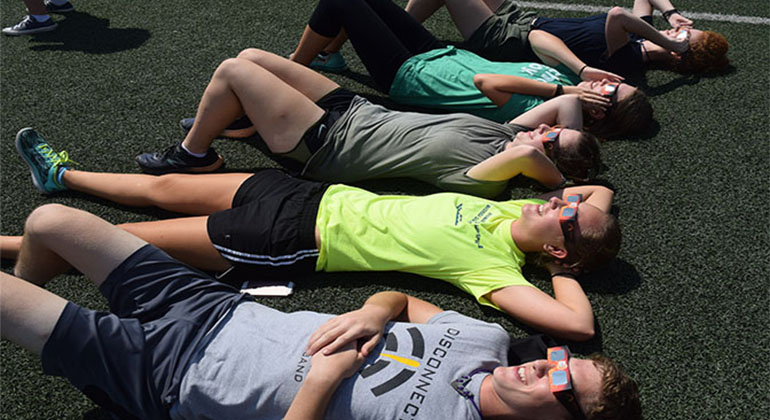Solar Eclipse Brings Excitement, Unity to North

With glasses in hand, students and teachers from North High conversed anxiously on the on the football field awaiting the total eclipse. As 1:17 p.m. hit, shielded eyes looked toward the sky to see the event of century: the total eclipse. The total solar eclipse, when the Moon fully blocks the Sun, took place on August 21, 2017; the last eclipse with a path of totality took place in 1979.
Millions across the country awaited the eclipse with their friends, coworkers, and family. As the day progressed, excitement heightened.
“[The morning of the eclipse], my kids woke up excited. Every class we talked about it, it started getting more and more excited. The excitement built as the day went on,” said science teacher Megan Yemm.
After attending their A-day classes, students made their way to their academic labs, where protective eyewear was distributed and a safety video was watched. However, conversations about this rare occasion started long before the actual day.
“On the very first day of school, we were already talking about it and then we revisited some of the ideas about it on the second day of academic lab. We had several conversations before about it: what to expect, what we think might happen, and then obviously the safety part of it,” said Yemm.
Labs were then dismissed to the stadium, where they sat on the field and bleachers awaiting the eclipse.
“It was so cool to see kids just out there hanging out. As it [the time of totality] got closer, people started getting quieter and noticing things. It was short, but for that time period it was very exciting,” said Yemm.
When the total eclipse finally took place, the moment was surreal for many. “When I was imagining [the eclipse] I thought, ‘Oh my gosh, this is lame. Why are we doing this?’ But when I got there I was like, ‘Oh I get it. People actually care about it because it is so beautiful.’ It was nice to see the [corona] around the moon, but it was creepy though because it was dark and the cicadas started buzzing,” said senior Calysta Yalew.
While some students watched from other places, the awe of the eclipse wasn’t lost.
“I was stationed on the tennis courts, providing the livestream for all of Parkway. On the tennis courts, there were about 60 of us. Some of my students from previous years came out to see it and it just gives me goosebumps to just remember it, to just think back to the positive energy, the excitement, the wonder, and that we all shared that moment together,” said science teacher Karen LaFever.
Although the eclipse only lasted 30 seconds, the memory is one that will have a lasting impression.
“In education, we have this thing called the teachable moment, and it’s when you stop whatever you’re doing because whatever is happening in the world is more important. The eclipse yesterday was a teachable moment; it was a time to stop everything and absolutely learn astronomy at that time, but also discover the power of shared experiences. We are so divided right now and to have the entire country stop and look up and wonder [is amazing]. Everyone, no matter what your background is, that’s a teachable moment and we had to take advantage of that,” said LaFever.
Roshae Hemmings, Editor-in-Cheif